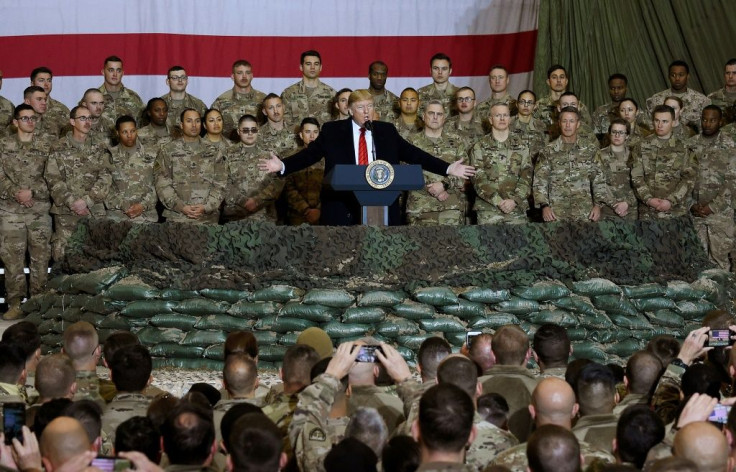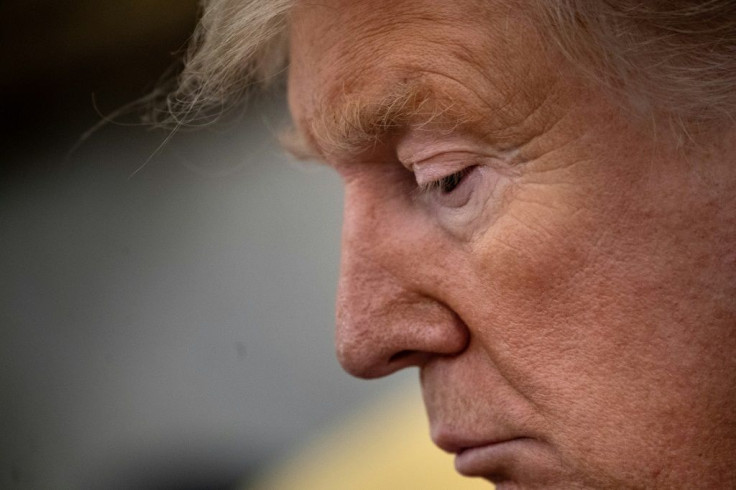Trump's Approval Rating Plummets Among US Military, New Poll Reveals

KEY POINTS
- New poll reveals 50% of active U.S. Armed Forces disapprove of the way Trump handles his job
- His dissatisfaction rating among the military has been on the rise since 2016
- The resignation of Jim Mattis and the betrayal of the Kurds are being held against Trump
Officers and men of the United States Armed Forces disapprove of the way president Donald Trump handles his job as Commander-in-Chief, with the latest poll showing a continuation of Trump's unpopularity that began when he was elected president in 2016.
Half of active-duty military personnel involved in a new poll by Military Times conducted from Oct. 23 to Dec. 2 hold an unfavorable view of Trump. Analysts said this confirms a continued decline in Trump's approval rating among the U.S. military since he was elected in 2016.
The poll shows 50 percent of the 1,630 active duty troops polled have an unfavorable view of Trump while 42 percent approved of his performance. The 50 percent dissatisfaction rating is Trump's lowest in the survey since being elected president. In November 2016, 46 percent of troops surveyed had a positive view of Trump while 37 percent had a negative opinion of him in a poll taken just a few weeks after his electoral victory.
The plunge in Trump’s popularity in the MIlitary Times poll indicates growing dissatisfaction with Trump and his handling of several military issues, according to Peter Feaver, a former White House adviser to former President George W. Bush, who is now a political science professor at Duke University.
Trump fared poorly in the poll over his handling of military issues. Almost 48 percent of troops surveyed said they have an unfavorable view of Trump as regards military issues compared to 44 percent that believe otherwise. This finding is a significant comedown from the 2018 Military Times poll when 59 percent said they were happy with Trump's handling of military issues. Only 20 percent held an unfavorable view at the time.

This remarkable loss in confidence is due to a number of major events affecting the U.S. military since 2018 that put Trump in a bad light. In December 2018, former defense secretary and retired Marine Corps Gen. Jim Mattis resigned from his job to protest Trump's plan to pull U.S. troops completely out of war-torn Syria. Trump said the remnants of the Islamic State should be dealt with by other countries in the region.
In October 2019, Trump went ahead anyway and ordered the sudden withdrawal of U.S. forces from Syria leading to Turkey's invasion and attacks on the Kurdish allies of the U.S.
This betrayal of the Kurds was loudly condemned by the military. The Military Times poll reveals 58 percent of respondents saying they disapproved of Trump’s decision to withdraw U.S. forces from northern Syria in the face of Turkish military attacks.
Mattis still enjoys a high 86 percent favorability rating among the military despite leaving office almost a year ago. In contrast, his replacement, Mark Esper, only has a 24 percent approval rating from troops.
On September 24, Trump became the subject of impeachment hearings in the House over the delay of military assistance funding to Ukraine in exchange for political favors from the Ukrainian government.
The border wall with Mexico was also another sore point with the U.S. military. Trump’s decision to use military construction funds to build his "beautiful" border wall was disapproved by 59 percent of the military respondents. More than half said current U.S. relations with “traditional allies” like NATO are poor under Trump.
In this poll, respondents identifying themselves as conservative comprised one-third of the total compared to liberals that accounted for one-quarter. Service members identifying as political independents constituted 45 percent of respondents, an increase of 3 percent compared to the 2018 survey.
© Copyright IBTimes 2024. All rights reserved.





















